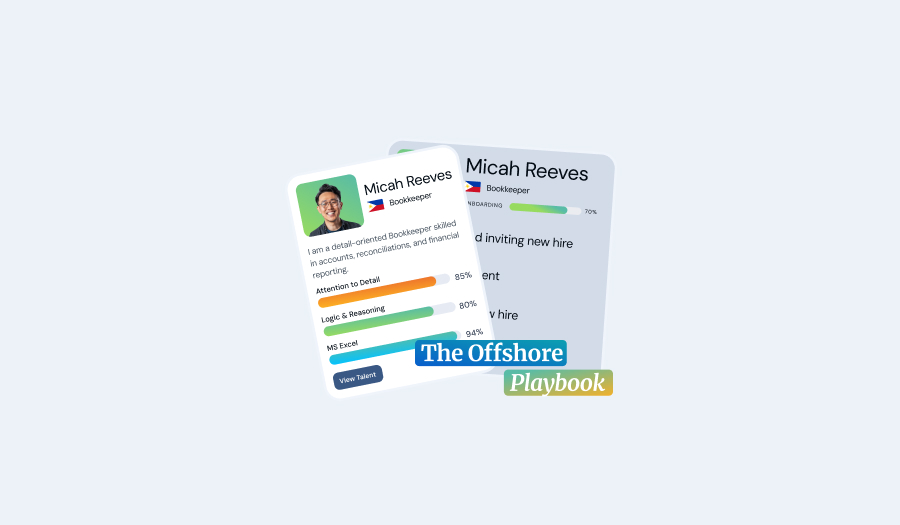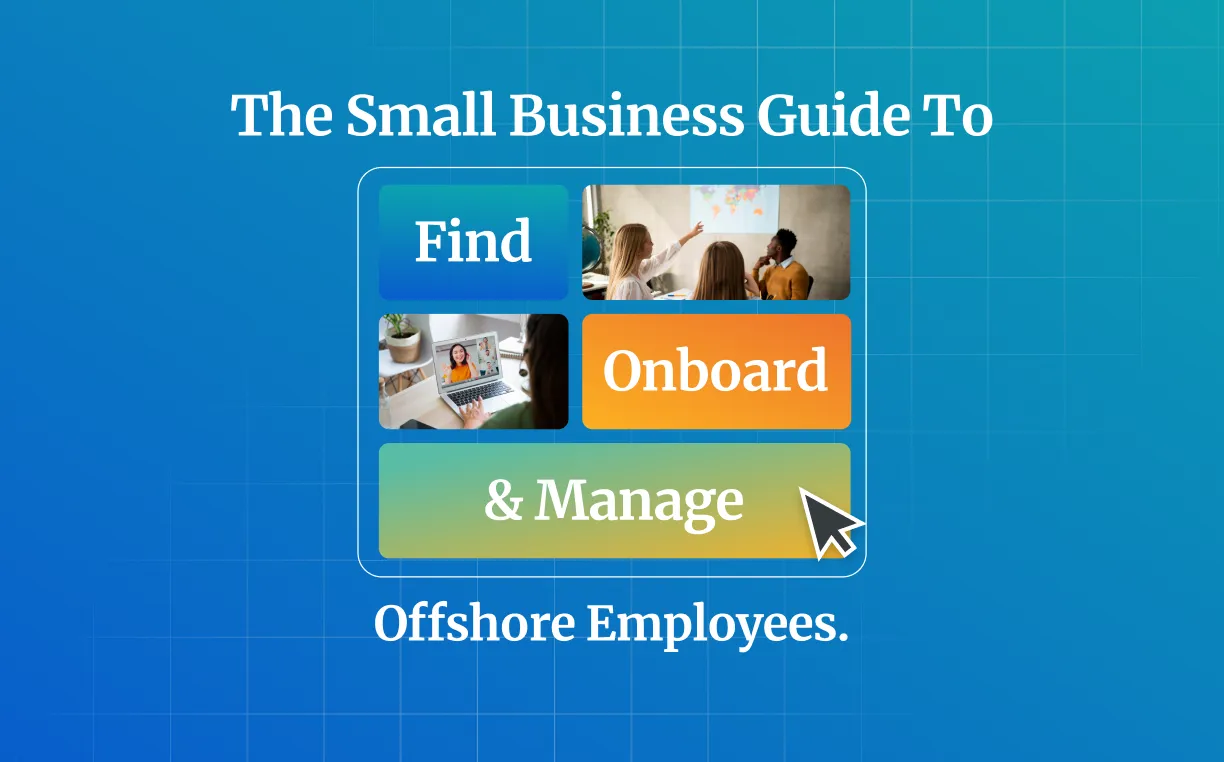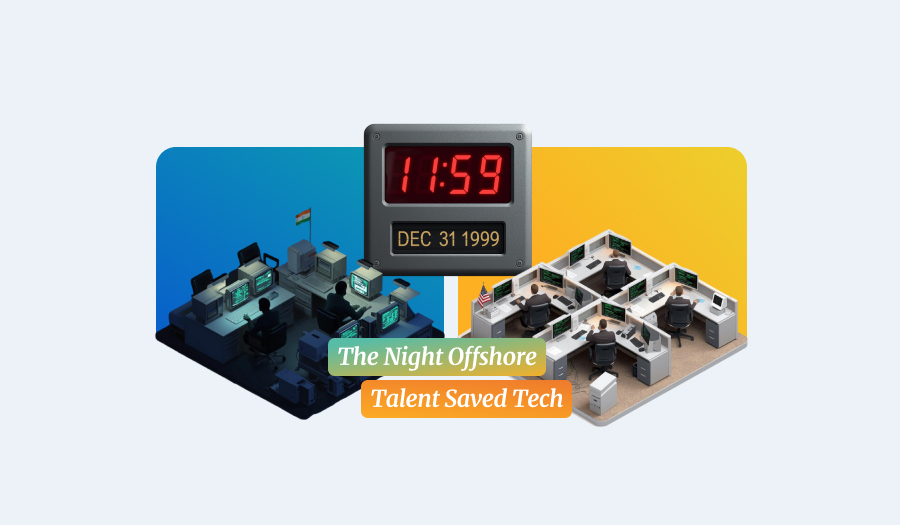The Offshore Playbook: How to Vet, Onboard, and Manage Remote Bookkeepers Without Regret
Key Takeaways
- Delegating your books is not just about saving time, it is about protecting the financial core of your business.
- Vague job descriptions and unstructured vetting are the fastest paths to bad hires. Precision, testing, and credential checks are non-negotiable.
- Structured onboarding, outcome-based management, and strong security protocols shorten time-to-productivity, prevent costly micromanagement, and protect sensitive financial data.
- Even the best hire may not work out. Clear performance standards and decisive exit protocols keep your business resilient.
- AbroadWorks builds these steps into its model, providing a turnkey framework that reduces risk, accelerates results, and delivers peace of mind.
Handing over your books can feel like giving a stranger the keys to both your car and your browser history: risky, awkward, and possibly life-destroying if you get it wrong. Every invoice, payroll run, and reconciliation lives at the core of your business, and giving that to the wrong person can undo years of work.
Regardless, we have made the case for firing your inner bookkeeper, the exhausted founder hunched over spreadsheets at midnight. Ironically, you, the entrepreneur responsible for driving the business forward, are often too overworked and underqualified to handle the day-to-day accounting and should, instead, focus your energy on strategy and growing the business. Furthermore, we have also shown why offshore beats in-house in every category that matters: cost, talent, technology, and time. There is an abundance of world-class but affordable talent that can be the operational foundation of your business, just not in your neighborhood.
Once convinced that your business is better served with you focusing on the bigger picture, rather than getting your hands dirty in the daily grind, the next logical step is figuring out how to identify and recruit the talent you need to keep the wheels of your business turning. This is a boots-on-the-ground playbook that turns earlier insights into execution. It involves the steps required to successfully onboard offshore accountants and bookkeepers while installing necessary guardrails. The right system shields you from rookie mistakes, protects your finances from exposure, and frees you to make decisions with clarity instead of fear.
Step 1: Write the Job Description Your Inner Bookkeeper Would Flunk
If your job description reads like it was copy-pasted from Indeed in 2009, congratulations; you have just opened auditions for a bookkeeper copy-pasted from 2009. The fastest way to end up with a mismatched offshore bookkeeper is to recycle a generic template filled with buzzwords. In fact, unclear job descriptions are one of the top causes of failed hires, with nearly 50% of small businesses reporting misaligned expectations as their biggest recruiting mistake (SHRM, 2023).
Start by naming the real deliverables. Bookkeeping is not a single skill; it includes reconciliations, payroll, accounts payable and receivable, and monthly close. Vague descriptions invite underqualified candidates, while specificity screens them out before they ever hit your inbox. If you expect accurate monthly reporting, say so. If you want experience with complex reconciliations, spell it out. Candidates who cannot meet those requirements will move on quickly, saving you wasted time.
Next, define the tools. Whether your business runs on QuickBooks, Xero, Google Sheets, or Slack, candidates need to know upfront. The 2024 Accountant Tech Survey found that 95% of accountants now rate tech fluency as important as accounting skills (Firm of the Future, 2024). When you name your stack in the job description, you are not just filtering for software familiarity, you are signaling how modern and efficient your operation really is.
Then, set expectations around availability. Outline hours, time zone overlaps, and communication rhythms in writing. Misaligned availability is one of the top three drivers of offshore hiring failure, yet it is the easiest to avoid. If you need a daily check-in by 9 a.m. EST, make that explicit. Ambiguity here creates costly mismatches that no amount of goodwill can fix.
Finally, banish the fluff. Phrases like “self-starter” or “fast-paced environment” mean nothing. They do not clarify performance expectations; they just add noise. Write the description as if you are hiring someone to audit you because, in many ways, you are. Your bookkeeper is not just filling in spreadsheets; they are safeguarding the financial core of your business.
Step 2: Vet Like You are Hiring Your Replacement
The interview process is where most founders default to gut instinct, and that is a costly mistake. Studies show that structured assessments are nearly twice as predictive of job success as unstructured interviews (Harvard Business Review, 2019). You cannot afford to hire blind.
Instead, insist on role-specific tests. Ask candidates to perform a sample reconciliation or spot errors in a dummy ledger. This quickly separates the polished resumes from the professionals who can actually deliver. If they cannot handle a controlled test, they will not handle your real books.
Credentials also matter. Look for certifications such as CPA, Chartered Accountant, or QuickBooks ProAdvisor. These are not just titles, they are signals of formal training and adherence to accounting standards, like U.S. GAAP. When combined with responsiveness over Zoom or Slack, you begin to see not just technical skill, but reliability and communication strength.
Finally, filter for compatibility. A great hire in theory is useless if they cannot work in your time zone or navigate your tech stack. Confirm overlap before you commit, especially when hiring offshore bookkeepers working across time zones. It is better to be strict now than to struggle later with mismatched schedules.
Step 3: Onboard Like You Want Them Productive in 48 Hours
Onboarding is where most outsourcing arrangements fall apart. According to Glassdoor, strong onboarding improves retention by over 80% and accelerates time-to-productivity by more than 70% (Glassdoor, 2024). Yet many founders treat it as an afterthought.
Start before Day 1. Set up credentials, software access, and SOPs in advance. Share example reports and templates so your hire understands exactly what “good” looks like. By the time they log in, they should already have a roadmap.
Furthermore, set expectations for daily and weekly output. Availability is not performance; deliverables are. A bookkeeper who knows the expected end-of-day or end-of-week results will hit stride far faster than one left guessing. Whenever possible, pair them with an internal anchor. This could be a VA or operations manager, someone who can provide cultural context and answer quick questions. Or at least someone who at least knows why that one spreadsheet tab is called ‘DO NOT TOUCH!!’.
Step 4: Manage Without Micromanaging
Micromanagement kills momentum; sometimes any micromanagement at all means you become their least favorite Slack notification. Still, the absence of oversight breeds risk. The solution is outcome-based management. Define KRAs (Key Result Areas) instead of drowning your hire in endless to-do lists. When objectives are clear, accountability follows naturally.
Additionally, performance dashboards and shared folders can ensure that everyone is on the same page. These tools provide real-time visibility without constant interruptions. Asynchronous updates, such as weekly Slack summaries or Loom videos from your offshore bookkeeper, keep you informed without dragging everyone into unnecessary meetings. Lastly, establish a rhythm. Bi-weekly check-ins help course-correct, monthly retros highlight improvements, and quarterly reviews ensure alignment with strategy.
Step 5: Protect the Castle (Even if the Knight is Remote)
Your financial data is your business’s crown jewels. Do not protect them with a plastic sword and an expired antivirus subscription. Shockingly, only 17% of U.S. small businesses encrypt sensitive data internally, leaving most exposed to avoidable breaches (StrongDM, 2025). Offshore does not mean less secure; instead, it often means more.
Require SOC 2 Type II, ISO 27001, VPNs, and MFA as non-negotiables. These protections should be standard, not optional. Implement role-based access so your bookkeeper only sees what they need to see, nothing more. And always lock down contracts with NDAs and compliance clauses that reflect both U.S. law and the regulations in your provider’s country.
Bonus Round: Know When to Pivot, Coach, or Cut
Not every offshore accounting hire will work out, and the cost of keeping the wrong person is high. The U.S. Department of Labor estimates that a bad hire can cost up to 30% of the employee’s first-year earnings (USDOL, 2024). That is money and momentum you cannot afford to waste.
Essentially, learn to spot the red flags early. Missed deadlines, repeated inaccuracies, or resistance to feedback are signs of deeper issues. Distinguish between a training gap and a talent mismatch. One can be solved with coaching, the other requires replacement.
Another approach could be to adopt a two- or three-strike policy with clear documentation. This keeps the process fair but decisive. Good fences make good exits, and the sooner you move on from the wrong hire, the sooner you can find the right one.
Offshore Bookkeepers Done Right: The Bottom Line
Delegation is not about trust falls and hope. It is about systems. A well-run offshore team does not just lighten your workload. It transforms your finance function into a strategic weapon. While each of these steps can be done manually, AbroadWorks simplifies the process by building them into its hiring model. Instead of founders stitching together job descriptions, tests, and onboarding, AbroadWorks provides a turnkey framework that reduces risk and accelerates results.
Here is how AbroadWorks assists at every stage of recruiting offshore accountants and bookkeepers:
- Step 1: After a consultation during which we take time to understand your business, unique circumstances, and your vision, AbroadWorks provides tailored job descriptions and filters candidates against your required tech stack and deliverables.
- Step 2: We developed a world-class proprietary applicant tracking system on which we run role-specific skill tests, credential checks, and communication assessments before you ever see a resume.
- Step 3: From our experience assisting hundreds of founders and businesses across the US, we have mastered how to prepare Day 1 access, SOPs, and structured onboarding processes to shorten time-to-productivity.
- Step 4: AbroadWorks built a client portal with dashboards, async updates, and progress tracking to eliminate micromanagement.
- Step 5: Not only do we meet global compliance standards (SOC 2, ISO 27001) with controlled access and NDAs as defaults, we also insist on criminal and other background checks to ensure trust and reliability.
- Bonus: Finally, we have human resources teams that conduct performance monitoring and escalation protocols so you know when to retrain, reassign, or replace talent. We anticipate and solve potential issues before you even notice there may be some.
Ready to take your hands off the spreadsheets and keep your eyes on the prize? AbroadWorks makes it simple to hire, onboard, and manage a bookkeeper who delivers more than just balanced books. We deliver peace of mind.
Sources:
- SHRM, How to Write Effective Job Descriptions, 2023, https://www.shrm.org/resourcesandtools/hr-topics/talent-acquisition/pages/viewpoint-how-to-write-effective-job-descriptions.aspx
- Firm of the Future, Accountant Tech Survey 2024, 2024, https://www.firmofthefuture.com/news/accountant-tech-survey-2024
- Harvard Business Review, The Science of Better Hiring, 2019, https://hbr.org/2019/01/the-science-of-better-hiring
- Glassdoor, Onboarding Stats Every Employer Should Know, 2024, https://www.glassdoor.com/employers/blog/onboarding-statistics/
- StrongDM, Small Business Cybersecurity Statistics, 2025, https://www.strongdm.com/blog/small-business-cyber-security-statistics
- U.S. Department of Labor, The Cost of a Bad Hire, 2024, https://www.dol.gov/newsroom/releases/eta/eta20240123






